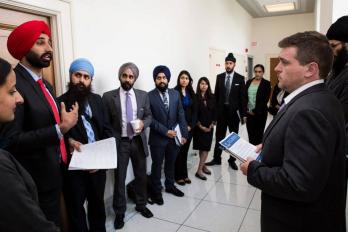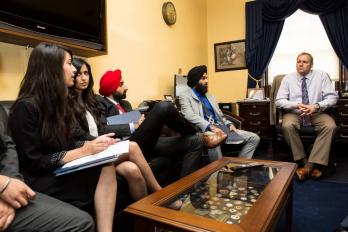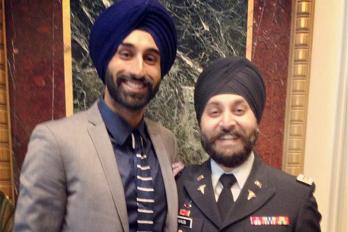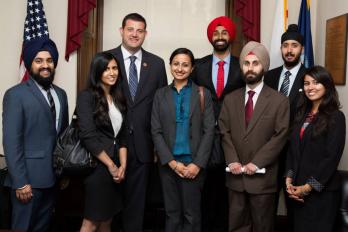TJSL Student Attends Sikh Civil Rights Summit in Washington, D.C.
July 15, 2013
TJSL Student Jasjit Dhanoa (3L) recently went to Washington, D.C. for a civil rights summit for the U.S. Sikh community to which he belongs.
Here is his account of the visit:
“In June, I was selected to participate in this prestigious program, which was held in Washington, D.C. Over 150 applicants from all backgrounds applied to the Sikh Advocate Academy and after a series of interviews, I was selected as one of ten applicants. The focus of the academy was to provide successful applicants with the tools and resources to address challenges facing the Sikh-American community. Issues highlighted this year included: equal opportunity employment within civil employment and the military, school bullying, TSA profiling, and hate crime tracking.
Following the events of 9/11, religious minorities such as Sikhs became the targets of bias-based violence. Sikhs are often targeted because of their visible religious articles and subjected to hate crimes, workplace discrimination, school bullying and racial profiling.
As members of the world’s fifth largest religion, Sikhs are distinguished by their visible identity that includes uncut hair, which Sikh men are required to keep covered with a turban (Sikh women also have the option of covering their hair with a turban). The turban is an article of faith and represents a Sikh’s commitment to equality, religious pluralism and justice for all.
The Sikh Coalition, the nation’s largest Sikh civil rights organization, was founded in 2001 in response to the backlash that was impacting the Sikh American community. Today, the organization continues to work towards the realization of civil and human rights of all people, with a particular focus on the Sikh community. Each year, the Sikh Coalition hosts the Sikh Advocate Academy – a week long, all expenses paid, experiential learning course which trains grassroots activists to engage with the Government, Media and community organizations to impact change.
The program included the opportunity to engage with government officials and civil rights leaders through panel sessions.
In addition, The Sikh Coalition had arranged for each of us to meet with our respective Member of Congress on Capitol Hill to address Sikh American civil rights issues. During my meeting with Daniel Zawitoski, chief of staff for San Diego Congressman Scott Peters, I had the opportunity to raise the issue of equal opportunity for Sikhs to join the U.S. Army. We also had the opportunity to engage with Congressman David Valadao, co-chair of the newly formed American Sikh Congressional Caucus and Representative Jeff Denham of California.
At the end of the week, we attended a historic briefing at the White House discussing Sikh civil rights issues. This briefing, the second of its kind, was organized in collaboration with the White House Initiative on Asian Americans and Pacific Islanders and the White House Office of Public Engagement at the request of the Sikh Coalition. The assembled community members enthusiastically questioned federal agency officials after each of their presentations. They shared critical feedback and ideas on how the federal government can better connect with and serve the Sikh community.
The briefing took place in the Indian Treaty Room in the Eisenhower Executive Office Building. Key speakers included: Commissioner Chai Feldblum of the Equal Employment Opportunity Commission; Kimberly Walton, Assistant Administrator of the Transportation Security Administration; Anurima Bhargava, Chief of the Educational Opportunities Section, of the U.S. Department of Justice; and Grande Lum, Director of the Community Relations Service of the U.S. Department of Justice. These speakers spoke about the federal government’s efforts to combat employment discrimination, airport profiling, and school bullying respectively.
In addition, Audrey Buehring, Deputy Director of the White House Initiative on Asian Americans and Pacific Islanders spoke about the work of the Initiative to address Sikh and broader Asian American and Pacific Islander concerns. Finally, Gautam Raghavan and Paul Monteiro of the White House Office of Public Engagement addressed the participants. Attendees were grateful for the words of Major Kamaljeet Singh Kalsi and Harpreet Singh Mokha, Mid-Atlantic Regional Director of the Community Relations Service at the briefing.
While I had the opportunity to speak with all the speakers, my most memorable meeting was with Major Kamaljeet Singh Kalsi – one of three Sikhs accepted into the army with his full Sikh articles of faith intact. Currently, Sikhs must ask for special exemptions and face many hurdles to serve with their turbans and beards. The Sikh Coalition and law firm McDermott Will & Emery LLP were successful in securing exemptions for Major Kalsi and his two colleagues. Now, the Sikh Coalition is campaigning for the Obama Administration to provide devout Sikh Americans an equal opportunity to serve in the U.S. Armed Forces.
Following the White House Briefing, a reception was hosted at the new building of the prestigious law firm of McDermott Will & Emery LLP where I, and my fellow Advocates, were awarded an official certification as a volunteer Sikh Coalition Advocate.
As an Advocate for the Sikh Coalition I am now tasked with ensuring that Sikhs and all Americans are provided with their full human and civil rights. I am grateful for the leadership opportunity that the Sikh Advocate Academy provided me.”
Dhanoa is currently interning at The Barger Law Group with TJSL alumna and adjunct professor, Danielle Barger. He is also employed with international human rights organization, Ensaaf. Ensaaf is working to achieve justice for human rights violations allegedly committed in Punjab by the Indian Government.



